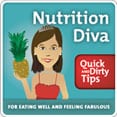There’s an old song from the 1940s that says that if you want to be happy, “you got to ac-cent-tchu-ate the positive!” I think that this is also really good advice for those of us who are trying to improve our diet and eating habits.
This article is available as a podcast:
A lot of the dietary advice we get focuses on “bad” foods that need to be eliminated; things like snacks and desserts, French fries and soda pop—you know, all the better things in life. But as anyone who has ever spent any time with a 2-year-old knows, the best way to focus that toddler’s attention and will on a particular object or action is to forbid it.
I think our appetites are pretty much like toddlers. When we’re told—or even when we tell ourselves—that we have to cut back or give up a favorite treat, it’s hard not to feel deprived. It can be hard to stop thinking about that thing we can’t have. And all that thinking about whatever-it-is we’re trying to go without can make avoiding or resisting it feel even harder.
Focusing on Positives Can Make Dieting More Effective
This reminds me of a dietary study that came out a couple of years ago. They took a few hundred overweight adults who had just been diagnosed with Type 2 diabetes and divided them into two groups. Both groups were told that they would need to make changes to their diet in order to lose weight and manage their disease. They were told to limit their total caloric intake and instructed on things like portion sizes. Beyond that, however, the two groups got different instructions.
Group #1 was taught how to limit their intake of fat to no more than 30% of calories and to keep their saturated fat under 10%. They were also told to avoid sweets and refined grains. This is the standard prescription for a “reduced-fat, low-calorie” diet.
Lucky Group #2, however, got a different prescription. They were told to increase their intake of vegetables, fish, and poultry, to choose whole grains, and to use olive oil as their primary source of fat. This is the standard Mediterranean diet prescription.
Four years later, Group #2 had lost more weight and was also only half as likely to need medication to control their blood sugar. In the paper, the researchers talk a lot about the nutritional differences between the two diets—which, quite honestly, weren’t all that dramatic—and how they may have contributed to the different outcomes.
But I was struck by something else: Group 1 was told what not to eat and Group 2 was told what to eat more of. And look who fared better. I suspect that focusing on the positives rather than the negatives might be a much better strategy for handling that inner toddler—a strategy that we could use to make our efforts to eat healthier just that much easier.
No Dessert? No Problem!
As many of you know, I have a bit of a sweet tooth and I’ve never been able to completely shake the habit of wanting to finish every meal with something sweet. At the same time, I’m fully aware of the dangers of excessive sugar consumption. If I were to focus on going without dessert for an entire week, my inner toddler would probably stamp her foot and threaten to hold her breath until someone forked over some of those little red Swedish fish that I—I mean, she—loves so much.
Instead, I take my inner toddler to the market and let her pick out 7 different kinds of luscious fruit—a different one for every night of the week!
The more exotic or unusual, the better. Having an apple every night after diner wouldn’t be that exciting. But ripe berries on Monday. fresh pineapple on Tuesday, a juicy peach on Wednesday, decadent figs on Thursday….that’s something I can authentically look forward to.
Likewise, I’ve found that serving up two or even three different kinds of vegetables at dinner—each prepared in favorite, yummy way—completely takes the sting out of eliminating the bread, rolls and other minimally nutritious starches.
And instead of going out for Italian food and exhausting my willpower on not eating all the pasta—or heading to a burger bar and drooling over my neighbor’s fries (and once I’ve drooled on it, it’s mine, right?)—I try to find enticing restaurants that are more in line with my dietary strategy, such as a tapas place or that bistro with the to-die-for salads.
Got the idea? My challenge for you this week is to accentuate the positives in your healthy diet. Rather than focus on things that you’re trying not to eat, find ways to get more excited about the stuff you know you should be eating more of. Feel free to try this on any actual toddlers you may have in your life—or, for that matter, partners or teenagers who act like toddlers when you try to encourage them to eat better.
And then, report back here. What strategies did you come up with? How did it work for you? Is there anything to the idea that focusing on what you’re going to add to your menus is a more effective way to motivate positive change than focusing on what you’re giving up or cutting back on?







